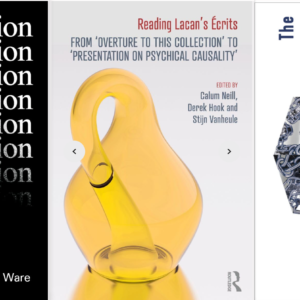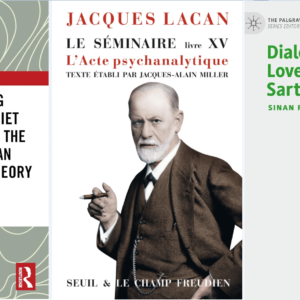News – April 2018
Beginning with the latest publications in the Lacanian field, released last month was the new collection Unconscious Incarnations edited by Brian W. Becker, John Panteleimon Manoussakis, and David M. Goodman. Focussing on the status of the body in psychoanalytic theory and practice, it examines concepts like trauma, healing, desire, subjectivity, and the unconscious from an interdisciplinary perspective that brings Freud and Lacan into conversation with continental philosophy.
Newly-released from the Palgrave Lacan Series is Lacan and the Posthuman, edited by Svitlana Matviyenko and Judith Roof. The collection looks at what psychoanalysis adds to contemporary conversations about subject/object relations, systems, perspectives, and values in the posthuman age. Its chapters deal with posthumanism as sinthome, posthumanism and the baroque, cybernetic theories of causality, and graphocentrism, among many others. A full chapter list is available on the publishers’ site.
Routledge published Donald L. Carveth’s Psychoanalytic Thinking: A Dialectical Critique of Contemporary Theory and Practice at the end of last month. While the book discusses Lacan with other post-Freudians like Klein, Bion, Fromm, and Kohut, Carveth attempts a dialogue and mutual critique between them as part of “an ever-evolving synthesis” of psychoanalytic disciplines. Carveth is Emeritus Professor of Sociology and Social and Political Thought at York University, Toronto. He was also previously Director of the Toronto Institute of Psychoanalysis and Editor-in-Chief of the Canadian Journal of Psychoanalysis/Revue Canadienne de Psychanalyse. A video of Carveth discussing the book is on YouTube here.
The English translation of Catherine Millot’s Life With Lacan was released last month. Awarded the André Gide Prize for Literature, in this short volume Millot reminisces about her relationship with Lacan – both as analysand and lover – during the 1970s up to Lacan’s death in 1981. You can read some of the more salacious details in Stuart Jeffries’ (largely complementary) review for The Spectator.
As heralded earlier this year, CFAR will publish its collection of essays on Obsessional Neurosis: Lacanian Perspectives this month through publishers Routledge. Edited by Astrid Gessert, it seeks to challenge the cliches which reduce obsession to the question ‘Am I alive or dead?’ and instead examines obsession viathemes such as debt, guilt, action, aggression, and solicitude.
Announced in April for publication later this year is a translation of Colette Soler’s work on Lacan and Joyce, taking the English title Lacan Reading Joyce. Originally published in France in 2015, it naturally focuses on Lacan’s Seminar XXIII devoted to the Irish writer, but in particular Soler explores what Lacan learned from Joyce for the development of his later work.
Also newly-announced is Shanna de la Torre’s Sex for Structuralists: The Non-Oedipal Logics of Femininity and Psychosis which is due for release by Palgrave Macmillan in October. It looks at key texts on myth, trauma, and unconscious frantasy by Freud, Lacan, and Lévi-Strauss, and the status of structuralism in an age post the incest prohibition and zero symbol.
Looking further ahead, announced last month for release at the start of 2019 is Eliot Rosenstock’s Zizek in the Clinic: A Revolutionary Proposal for a New Endgame in Psychotherapy. As a psychotherapist, Rosenstock proposes a philosophical foundation for mental health treatments based on Zizek’s work.
Among the journals, the latest edition of Lacanian Ink, number 51, was released last month. Its theme this time is ‘The Political’ – a topic which has occupied many WAP-affiliated organisations in the past year – and it presents papers by Jacques-Alain Miller on ‘Heresy and Orthodoxy’, Eric Laurent on ‘Shame and Self-Hatred’, as well as Francois Regnault’s tribute to the late Judith Miller. Full contents and previous editions of the journal are on Lacan.com.
Recommended for Lacanians interested in the development of the French school of psychoanalysis around Lacan will be the latest New Books podcast with Dominique Scarfone who discusses his 2015 book The Unpast: The Actual Unconscious. Scarfone is an Honorary Professor at the University of Montreal and one of the world’s leading experts on Lacan’s contemporary, Jean Laplanche. Like both Lacan and Laplanche, Scarfone’s project is to chart “a new itinerary through the vast landscape that is Freud”, looking at themes of time and history with Freud’s drive theory and metapsychology.
For French speakers, published last month was Jean-Daniel Causse’s Lacan et le christianisme which explores Lacan’s interest in Christianity. His lifelong inspiration by Saint Augustin’s teaching, to the motifs of christendom which appear in the Borromean knot and concepts such as the Name-of-the-Father. Jean-Daniel Causse is a practicing psychoanalyst and professor of psychoanalytic studies at l’université Paul-Valéry-Montpellier 3.
Turning to upcoming events, Analytica will be hosting two events with Dr Bracha Ettinger on Saturday, 19th May as part of its ongoing Future Analyst Seminar. In the first, ‘Matrix/Phallus: Feminine Ends of Analysis’, Ettinger will discuss feminine sexuality and the clinical implications of a matrixial dimension of subjectivity for sex, gender, and desire. The second, ‘The Symptom of Art and The Art of the Symptom’ will look at what art can teach analysis, and vice versa. The seminars will be available by virtual transmission internationally. Registration for both is open here.
At the Freud Museum, London on 25th May, Todd McGowan will be giving a talk on ‘The Gaze as Cinematic Object’. McGowan will be exploring Hitchcock’s Vertigo and Orson Welles’ Citizen Kane to bring out the contrast between the theorisation of the gaze in film studies and in Lacanian psychoanalysis.
A reminder that the Freud Museum will also be hosting a conference on the films of David Lynch in May. Freud/Lynch: Behind the Curtain will run 26th-27th May and invites psychoanalysts, scholars and cinephiles to reflect on enigmas presented in Lynch’s work.
In the US, Lacanian Compass is organising an event in Miami on 10th May entitled ‘Violence: There where speech gives up’. It will address the nature of violence and the ethical implications of contemporary issues, like the decision to arm teachers in the United States, and the role of the law and symbolic order such moves entail. A round table of psychoanalysts will lead the discussion. More details on the group’s site here.
The Earl’s Court Clinical Group will host its next Open Meeting in London on Saturday 2nd June. Each of the four speakers will give a short presentation on a clinical topic which will then be opened up for discussion. Full details and tickets are available on Eventbrite here.
In New York City, the Training Institute for Mental Health will be holding an introductory seminar-workshop on Lacan’s clinical technique with David M. Castro on 18th May. It will include a clinical case presentation and supervision discussion drawing on principles derived from Lacan’s work. Full details are on the TIMH’s site here.
With the next NLS Congress,‘In a State of Transference’, due to take place 30th June-1st July, a number of preparatory events are organised for the month ahead by the NLS’s schools. The London Society will be hosting a seminar with Sophie Marret-Maleval entitled ‘Transference reveals the truth of love’ on Saturday 19th May, while the Irish Circle of the Lacanian Orientation will be holding its 6th Annual Study Day on Saturday 2nd June, with guest presenter Lynn Gaillard, under the title ‘Transference: In and Out’. The Argument for the Congress, registration, and blog are all now available.
Lastly, in London on Friday 11th May, the London Review Bookshop will host Lacanian psychoanalyst Bice Benvenuto to present her film The Villa of Mysteries, based on her 1994 book Concerning the Rites of Psychoanalysis. Tickets to attend and more information are on Eventbrite here.
Got news? Get in touch.




When can we expect the next ‘Amuse-Bouches’ column? As for Carveth, as much as he’s after a dialogue, it’s one directed towards a Kleinian perspective, from his YouTube seminars at least!
Hi Owen, do you know if there’s a table of contents available for “Obsessional Neurosis Today” by any chance?